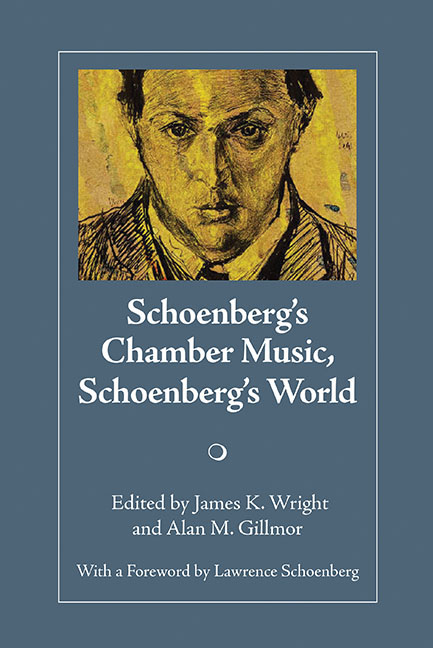Book contents
- Frontmatter
- Contents
- Foreword
- Preface
- HISTORICAL PERSPECTIVES
- ANALYTICAL PERSPECTIVES
- OTTAWA SYMPOSIUM AND CHAMBER MUSIC FESTIVAL PHOTOS
- PERFORMANCE, RECEPTION, AND INTERNATIONAL INFLUENCE
- Echoes of Pierrot Lunaire in American Music
- Expressivity, Color, and Articulation in Schoenberg's Seventeen Piano Fragments
- Critical Reception, Performance, and Impact of Schoenberg's Music and Thought in Canada Prior to 1960
Glenn Gould, Arnold Schoenberg, and Soviet Reception of the Second Viennese School
from PERFORMANCE, RECEPTION, AND INTERNATIONAL INFLUENCE
- Frontmatter
- Contents
- Foreword
- Preface
- HISTORICAL PERSPECTIVES
- ANALYTICAL PERSPECTIVES
- OTTAWA SYMPOSIUM AND CHAMBER MUSIC FESTIVAL PHOTOS
- PERFORMANCE, RECEPTION, AND INTERNATIONAL INFLUENCE
- Echoes of Pierrot Lunaire in American Music
- Expressivity, Color, and Articulation in Schoenberg's Seventeen Piano Fragments
- Critical Reception, Performance, and Impact of Schoenberg's Music and Thought in Canada Prior to 1960
Summary
Gould and Schoenberg
The year 2007 marked not only the seventy-fifth anniversary of Glenn Gould's birth and the twenty-fifth anniversary of his all-too-early death, but also the fiftieth anniversary of his historic concerts and lecture-recitals in Moscow and Leningrad. In this essay, I will reflect on the extraordinary impact Gould's Russian tour had on the appetite for musical modernism in the Soviet Union, in the middle of the Cold War, at a time when Soviet culture was beginning to emerge from the brutal artistic repressions of the Stalin years.
Gould was a passionate advocate for the music of Arnold Schoenberg. Lawrence Schoenberg has noted that “Canada has always been friendly to Arnold Schoenberg.” At mid-century, while most of Schoenberg's Canadian apostles were Austro-German expatriates—Otto Joachim, Lothar Klein, Alfred Rosé, Karl Steiner, and Gould's friend Franz Kraemer, for example–Gould was the most passionate among a new generation of home-grown Canadian Schoenbergians. He truly loved this important but difficult music, and he admired the rigour and rationality underlying its construction. Gould described Schoenberg as “a colossus of biblical proportions,” and considered twelve-tone technique the only truly valid innovation in twentieth-century musical language. Seeking a rapprochement between hostile audiences and the music of their time, Gould performed and recorded Schoenberg's music more than any other musician of his stature. Schoenberg fascinated him—as did Gibbons, Sweelinck, and Richard Strauss—because he was “one of the crucial pivot composers in music history.”
Like Schoenberg, Gould had an interest in music that was stripped of adornment. He felt that one of Schoenberg's achievements was to have effectively simplified compositional language after the chromatic excesses of the late nineteenth century, much as the composers of the late Renaissance had done with the modal music of their time. Like Schoenberg, Gould felt that music must always point to something mystical, beyond itself; it must always aspire to a higher truth and integrity. His prodigious technique notwithstanding, Gould was therefore strongly opposed to all forms of musical showmanship for its own sake.
- Type
- Chapter
- Information
- Schoenberg's Chamber Music, Schoenberg's World , pp. 237 - 258Publisher: Boydell & BrewerPrint publication year: 2009

